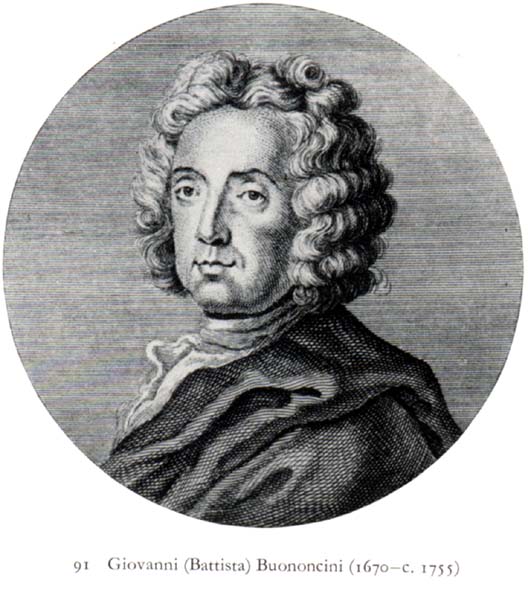

Italian composer and cellist. He studied with his father, Giovanni Maria Bononcini and (from about 1678) in Bologna with Giovanni Paolo Colonna. He entered the Accademia filarmonica in 1685, and two years later he became maestro di cappellaat S. Giovanni in Monte. During the next few years he fulfilled commissions in Modena and Bologna and published a number of vocal and instrumental pieces. He served as chamber musician for Filippo Colonna and his family in Rome (1692-97); during this period his successful opera Il trionfo di Camilla was performed at Naples (in 1696) and later at many other cities. From 1698 he served Leopold I in Vienna; he also served his successor, Joseph (from 1705). From 1714 to 1719 he was in the service of Johann Wenzel in Rome. His string of London successes began in 1720 with Astarto, performed at the Haymarket Theatre; subsequent works for the Royal Academy included Muzio Scevola (1721), Crispo (1722), Griselda (1722), Erminia (1723), and Calfurnia (1724). In spite of cabals against him (and against Italian opera altogether), his works were received with acclaim in London throughout the 1720s and were often in competition with Handel's works. In 1733 he was in Paris, where he composed works for the Concert spirituel; pensioned in Vienna by Maria Theresa, 1741. He was one of the most prominent international musical figures of his day; his output is extremely large and includes some 62 stage works, nearly 300 cantatas for solo voice, and sacred vocal works, including four Messe brevi (1688), a Laudate pueri (5 voices, orchestra, 1733), a Te Deum (1741), and three sacred madrigals; instrumental works, including Trattenimenti da camera à tre op. 1 (1685), Concerti da camera à tre op. 2 (1685), Sinfonie in 2-8 parts, opp. 3-6 (1685-87); Divertimenti da camera (1722), and XII Sonatas for the Chamber (1732).